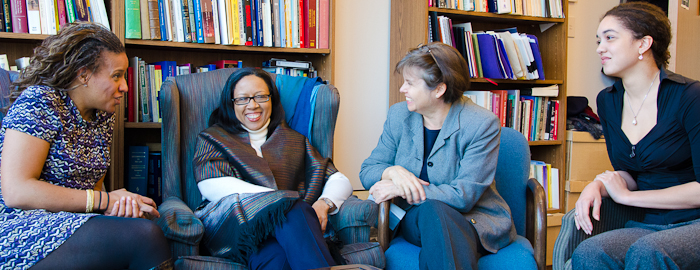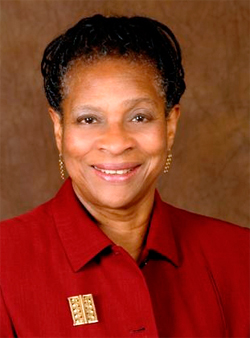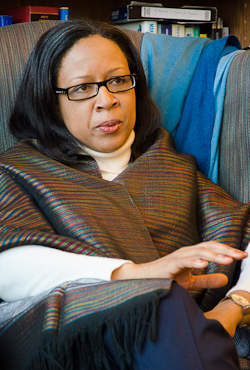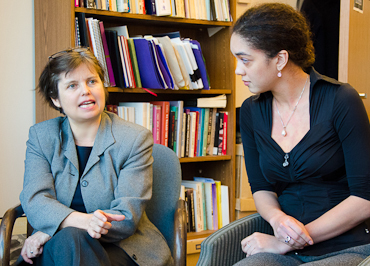
Justice Juanita Westmoreland-Traoré was the first black Canadian to become dean of a faculty of law and the first black Canadian appointed to the bench in Quebec. The Social justice, law and equality conference at the Faculty of Law in March will celebrate the career and contributions of this groundbreaking jurist.
By Victoria Leenders-Cheng

Adelle Blackett is what many would consider a legal and academic superstar: an associate professor of law and director of the Labour Law and Development Research Laboratory (LLDRL) at McGill, she also received the prestigious Bora Laskin National Fellowship in Human Rights Research for 2010-2011.
But when she was a young student considering post-secondary education options, she had not truly considered pursuing legal studies until a school librarian told her about Juanita Westmoreland-Traoré.
“I was a high school student growing up in Montreal and hadn’t really met any lawyers,” Blackett recalled. “Then my school librarian told me about Juanita, this beautiful, talented woman, and what she was doing in the world of law.”
At the time, Westmoreland-Traoré was already blazing trails, both for her work in social justice and as the first black woman to teach law, at the University of Montreal and at the University of Quebec at Montreal. In the 1980s, she sat on the Canadian Human Rights Commission and was the first chair of Quebec’s Conseil des communautés culturelles et de l’immigration.
”I carried this image of her with me right into law school, when I met her and was fortunate enough to have her become my mentor,” Blackett continued, adding that her interactions with Westmoreland-Traoré immediately surpassed any conceptions Blackett had of her. “She draws people to her, builds people up and does what she can to make sure that what she has learned through her experience is shared.”

Indeed, as Westmoreland-Traoré prepares to retire from the bench in 2012, her career is noted as much for its many accomplishments as it is for her warmth and humility.
“We wanted to host an event that would underscore Juanita’s contributions to the community and when I shared that idea with her, her reaction was, ‘Are you sure? There are so many judges who have done so many things,'” says Tamara Thermitus, an LL.M. student at McGill who is helping to organize the conference. “But I know many lawyers – not just from the Black community… – who say that she had a big impact on how they encounter the world.”
The conference program covers themes for which Westmoreland-Traoré is known as a strong advocate, such as equality in everyday life and at work, as well as justice in racialized and globalized communities, and the proceedings include a keynote speech by Afua Cooper on black people and notions of property in early North America.
There are three student groups involved in organizing the event and students will moderate conference panels and translate proceedings, which will be in both English and French, for American colleagues and judges who will be in attendance.
“Judge Westmoreland-Traoré is, even today, such a mentor to students,” said Ashley Adams, a conference organizer and a fourth-year law student at McGill, “so we’ve tried to have the conference reflect the fact that she is in tune with the community, with students and their realities and with the legal profession as a whole.”
Colleen Sheppard, director of the McGill Centre for Human Rights and Legal Pluralism, which is hosting the conference, had previously worked with Westmoreland-Traoré on social context education sessions for judges of the Court of Quebec.

“It’s been important for us as a human rights centre to profile Judge Westmoreland-Traoré,” she said. “She was appointed as the first black judge in Quebec in 1999 – which is only very recent, if you think about it. It’s not like it was 1952. And so this conference has been important for us as a political, moral and intellectual commitment as well.”
Added Thermitus, a trailblazer herself as the first black woman to win the Bar of Quebec’s Prix Mérite in 2011: “To start when Juanita started, a student in the 60s, to have a voice was not an easy thing. It takes a unique courage to voice your views and that’s why we wanted to share her skills and what she gave to the community.”
“We have to celebrate the people who bring forward the conversation about difference, about being seen as different, and who make sure these conversations stay alive.”
If you wish to participate, please REGISTER FOR THE CONFERENCE
Conference organizers
The Centre for Human Rights and Legal Pluralism (CHRLP)
The Labour Law and Development Research Laboratory (LLDRL)
Black Law Students’ Association of McGill
Aboriginal Law Students’ Association
This event is sponsored by the Law ’63 Fund, the Labour Law and Development Research Laboratory, and by the Aisenstadt Equality and Community Initiative. The Aisenstadt Initiative was established in 2011 at the CHRLP to enhance collaborations between universities and community-based organizations on issues relating to equality and access to fundamental social and economic rights.
More information can be found at: http://www.mcgill.ca/channels/announcements/item/?item_id=177073
